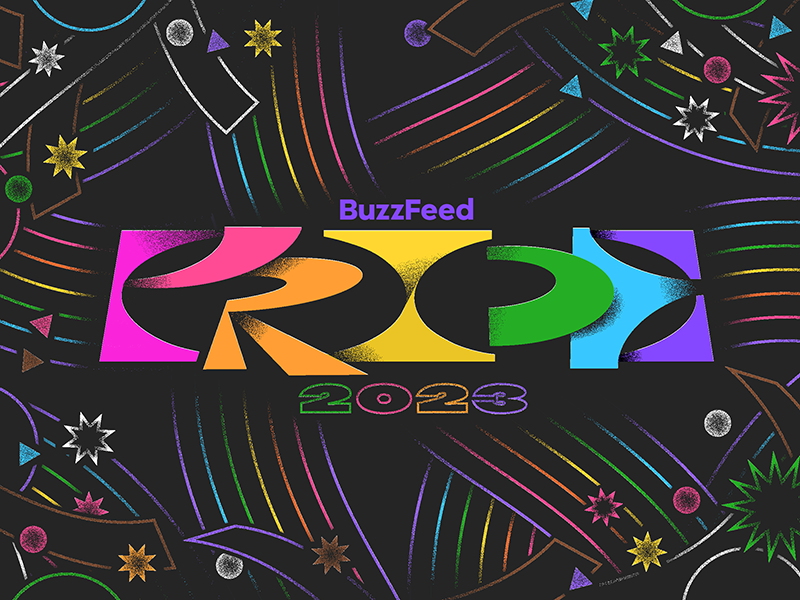Photographer Maxwell Poth Perfectly Captures What It's Like To Be An LGBTQ+ Kid In The US Today In His New Book, "Young Queer America"
Maxwell Poth is an LA-based professional photographer that has photographed some very big celebrities over the years; like Ricky Martin, Emily Hampshire, and Imagine Dragons' frontman Dan Reynolds. But, it is his work in documenting LGBTQ+ youth that is the focus of his wonderful and powerful first book, Young Queer America: Real Stories and Faces of LGBTQ+ Youth. The book features LGBTQ+ kids aged 11 to 18, from across the US, sharing their stories of what it is like being queer in America today.
It all started in 2019, when Maxwell — who grew up in Utah and was raised Mormon — learned that the leading cause of death in his home state for young people between the ages of 10 and 17 is suicide. This startling statistic led him to travel to Utah to document what it’s like for kids growing up "where no one is out…where being queer isn’t an option." Eventually, his work documenting LGBTQ+ youths would evolve into Project Contrast — a nonprofit that helps queer kids who are struggling to find community, connect with one another, and share their stories.
Recently, BuzzFeed got a chance to talk to Maxwell about Young Queer America: Real Stories and Faces of LGBTQ+ Youth, what it is like to document young queer people, religious trauma, and what kind of feedback he has gotten on the book (especially in this time of idiotic LGBTQ+ book bans).
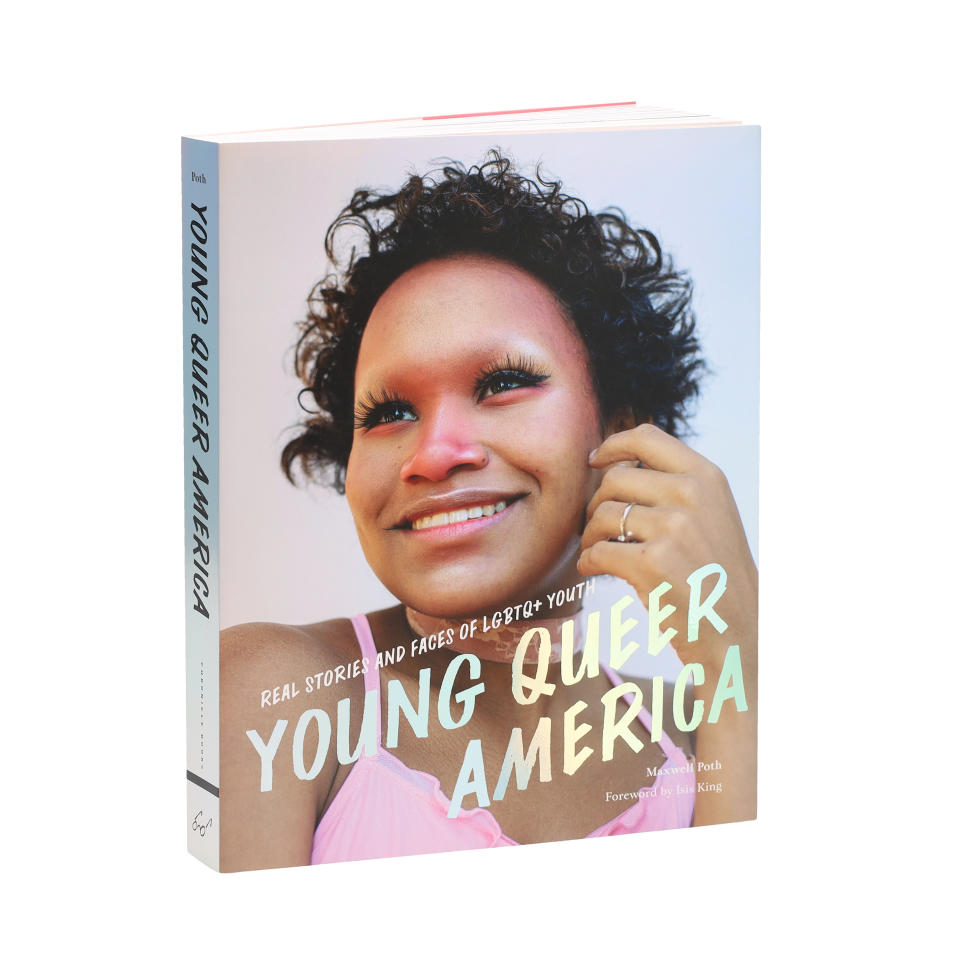
I wanted to start off by asking about Project Contrast — for people who not might not be familiar with it. Because aside from you being a photographer, you have a nonprofit, and I was interested to know what made you want to start it?
Maxwell Poth: I started it because it just felt like what I needed to do. I started it in my home state of Utah, and I started it there because I grew up gay — I was the only openly gay kid in my entire town, Bountiful, Utah. And I kind of just felt alone, and I had no one to talk to, or, like, even compare my life to and see other people like me. I also originally started it there because of the high suicide rates within queer youth in Utah alone; in fact, teen suicide was the leading cause of death. Since I am a photographer, it first did just start as a photo project, and from there, it just bloomed into a nonprofit, because I wanted to take it to more places than just Utah. And I wanted to highlight queer youth all over the country, and help struggling queer youth across the country find other queer people like them to hopefully build community. And that's kind of how Project Contrast started.
You actually sort of went into my next question, which is: What made you want to start documenting LGBTQ+ young people in particular?
MP: So yeah, I just wanted to highlight them, you know, for the reasons that I just said: helping them find community and showing these kids that there are other people like them. But, I did learn by doing it that these kids are just young advocates, because they have to be. And they're just wise beyond their years.
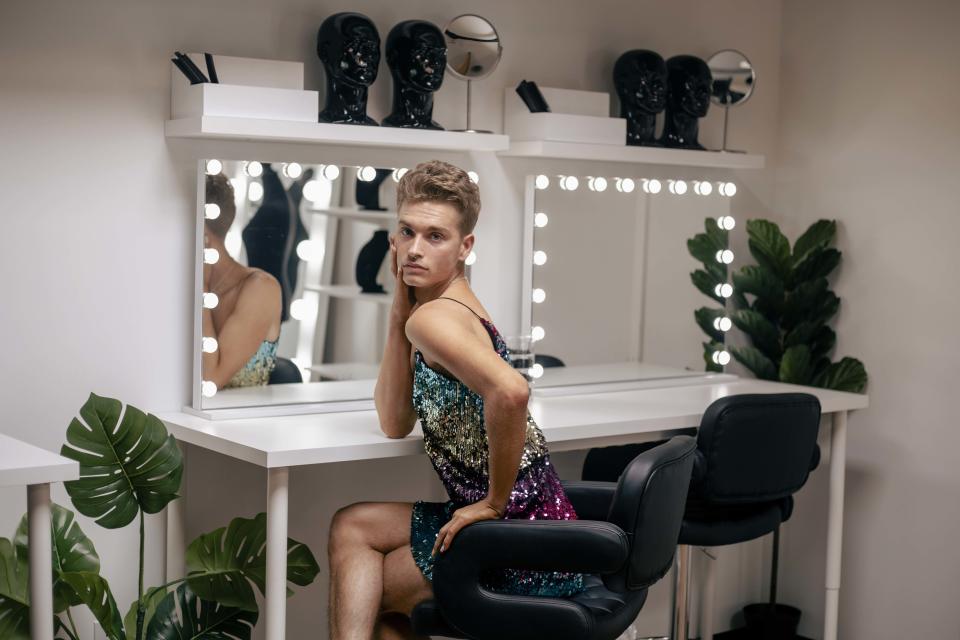
I wanted to touch a little bit on your religious upbringing, because I think for a lot of people, that can hinder them coming out, or it could it could leave them with a lot of internalized homophobia. So, what would you want to say to someone who is religious and is struggling with coming out? Or perhaps is suffering from religious trauma?
MP: Yeah, you know, religious trauma. And that question is so complex to me, because I don't want to be angry at religion, and I don't want to be angry or hateful toward religion, but you know, growing up Mormon, I do have a lot of anger toward it. I was lucky enough to get out of internalized homophobia with religion, like I never let religion tackle it, tackle me, and destroy me as much as I see a lot of other peers, especially peers back home in Utah, where it really just haunts them.
But, if you're struggling with religion and especially struggling with a religion that doesn't support you, it's really tough, because for so many of these people in that situation, that's all they know, it's all they're familiar with. So they're so afraid to leave because they think that's the only community they have. And I just want to give them the advice of trying to find people who accept you, validate who you are, and validate your queerness. Letting them know that validation and community doesn't have to come from an organized religion, that can come from so many different people in different groups to help you find that love and that confidence that religion is causing trauma for.
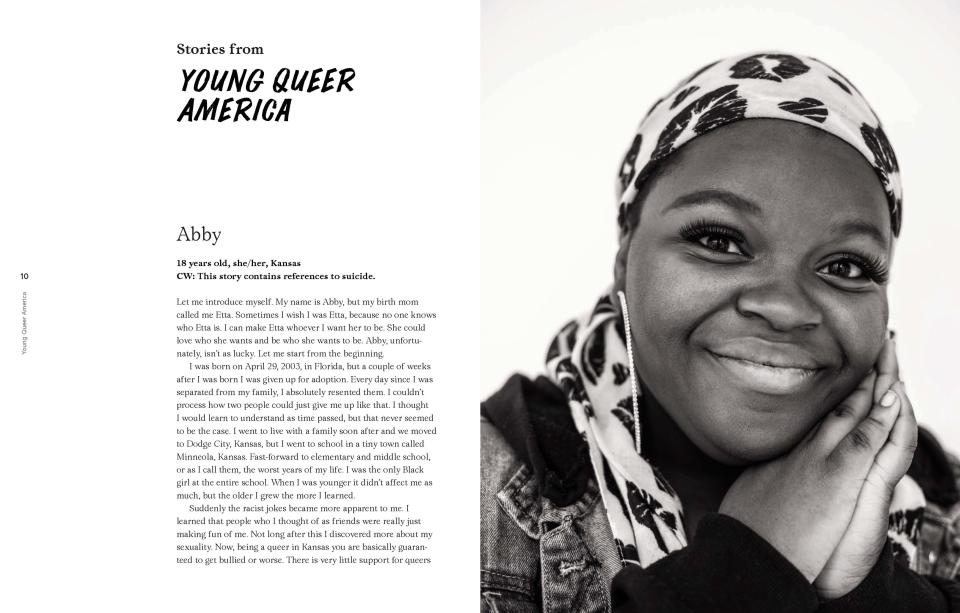
Obviously you, the LGBTQ+ people you photograph in the future, in your new book are Gen Z and Gen Alpha. Do you think the process of coming out has gotten any easier? And what new challenges do you see?
MP: Yes and no. I would definitely say it has become easier for the L and the G and the B of the LGBTQ+ community. But at the same time, it's not that it isn't as easy. So, it depends on where you live. I have seen a lot of white cis, gay men/boys come out and be able to live their lives.
This is something I actually like to mention, I have mentioned that in the past where if I went to some location, let's say I go to South Dakota, I have a white gay boy, a Black gay boy, and trans person — and they go to the same high school and live in the same town — all three of their answers will be different. Usually, the white gay boys now are saying, "Yeah, it's been pretty easy for me, my family accepts me, I have friends." And then, the Black gay boys I ask usually say something similar, but struggle mainly more with their family dynamic. And then, a trans person, it's kind of the whole nine yards, they're really struggling at home with their family, and they're struggling with people around them. Whereas, when I was younger, as a white gay boy, it wasn't talked about still. And so a lot has changed in that sense.
Online there seems to be, like, an obvious generational divide between older LGBTQ+ people, and, like, Gen Z, and Gen Alpha. What do you think millennials get wrong about younger LGBTQ+ people?
MP: Oh, interesting. I would say a lot of them feel definitely misunderstood, especially with the generation older than me. You know, I think my generation as I'm a millennial, a lot of us at the younger side, we tend to try and I guess, understand more, but it is definitely more about this fight on gender, that I see that a lot of older queer people struggle to understand. Like, with pronouns, and so many different ways of identifying yourself.
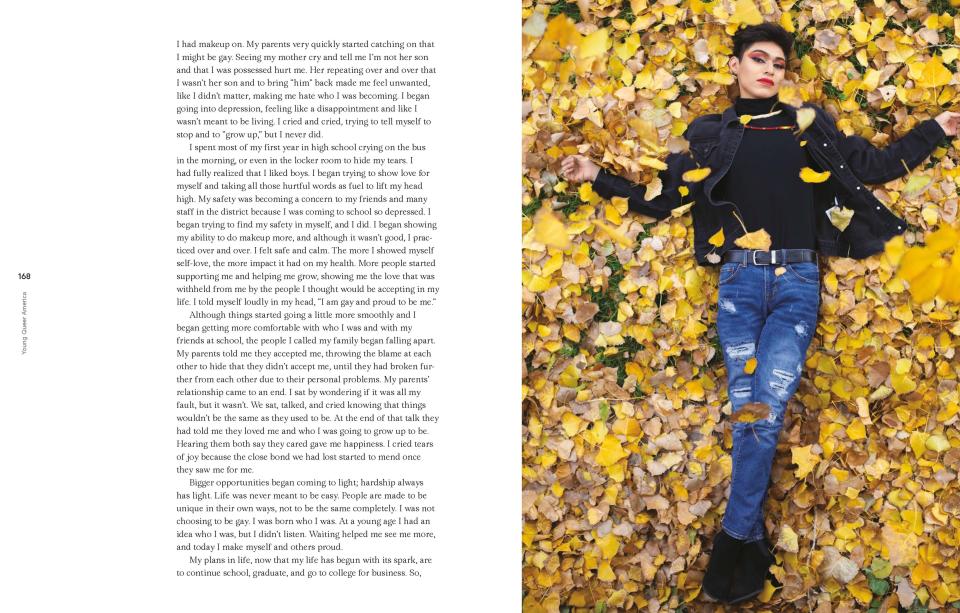
I did want to ask you about the subjects that you've documented over the years. Do you hear from them still? And how do they feel, in retrospect, about sharing so much of themselves publicly?
MP: Yes, I try and stay in contact with as many kids as possible. But, I kind of leave that up to them. I always leave the door open or have that outreach available. Some I only hear from when I meet them and document them, and then you know, they don't answer an email ever again, but others I talk to almost weekly if not, sometimes daily. So, it's kind of all up in the air there. There's so many of them, but I definitely do keep my tabs on them. And see them grow and have little, I call them zoom catch-ups. So, they kind of let me know when they want to hang out again and talk and tell me what's new.
Do you plan on maybe making this into, like, a series?
MP: Yeah, I definitely would love to keep going. If this book does well, I would love to do a Volume 2. I have, like, other ideas that aren't just queer youth. And I would love to, in a perfect world for me, which I see happening, is doing a young queer Canada, doing a young queer UK, and eventually going to other places, and figuring out how that would work. Because these young kids are the future of the queer community. And I feel like even though people interview queer kids in the past, and even now, like, I feel like nobody's necessarily doing exactly this, and I would love to keep going and make that a reality.
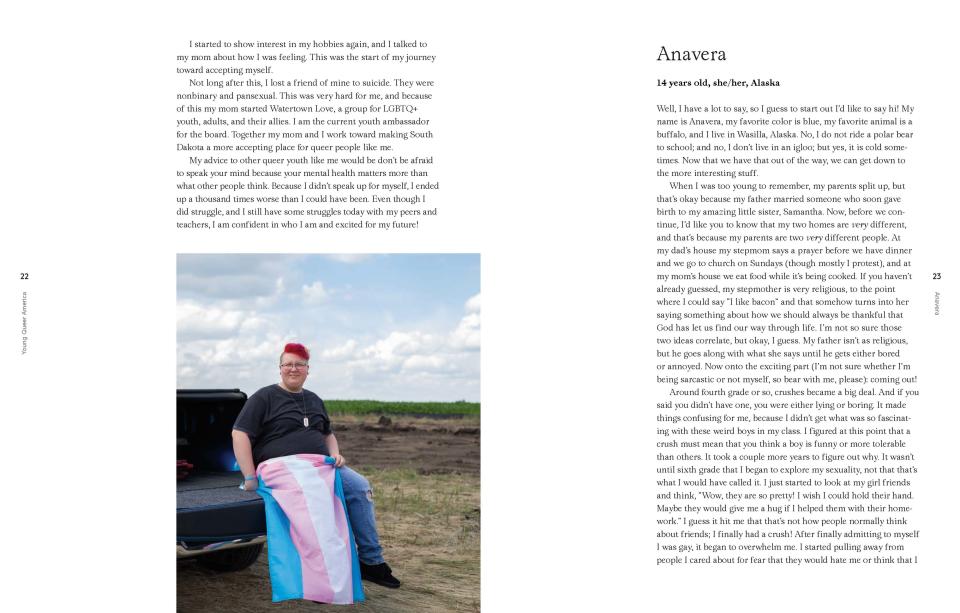
In an era of, like, all these nonsense book bans, how has the feedback been with your new book?
MP: So far, because it is only been out a month, I haven't seen too much in the book bans about my book. I've been seeing that they've been banning a lot of queer books in libraries. I just don't know if mine have reached those libraries yet, because we did just publish. But I can tell you that I am preparing for it. So are my kids.
Finally, what's the best feedback you've gotten with your project, from someone who came across it or participated?
MP: I mean, I get amazing feedback from the kids themselves. You know, once this book was published, a bunch of these kids were just sharing the most, like, loving messages and surprising messages. Usually, when I do a project like this, these stories get posted pretty quickly, like within a month or few months after, but these kids, they wrote these stories about two years ago. So, a lot of them have come back and been like, "Holy crap, like, I can't believe I wrote this, like, I needed to hear this even now."
Aside from that, just seeing other kids share this, a lot of these kids are getting outreach themselves after sharing it on their own platforms. And I've also gotten a lot of parents who have told me that they are glad this book exists, and that it even helped them understand their own queer child more. So, that's amazing.
You can buy Young Queer America: Real Stories and Faces of LGBTQ+ Youth through this link. And if you want to see more of Maxwell's work, you can check out his website, and learn more about Project Contrast over on their site.
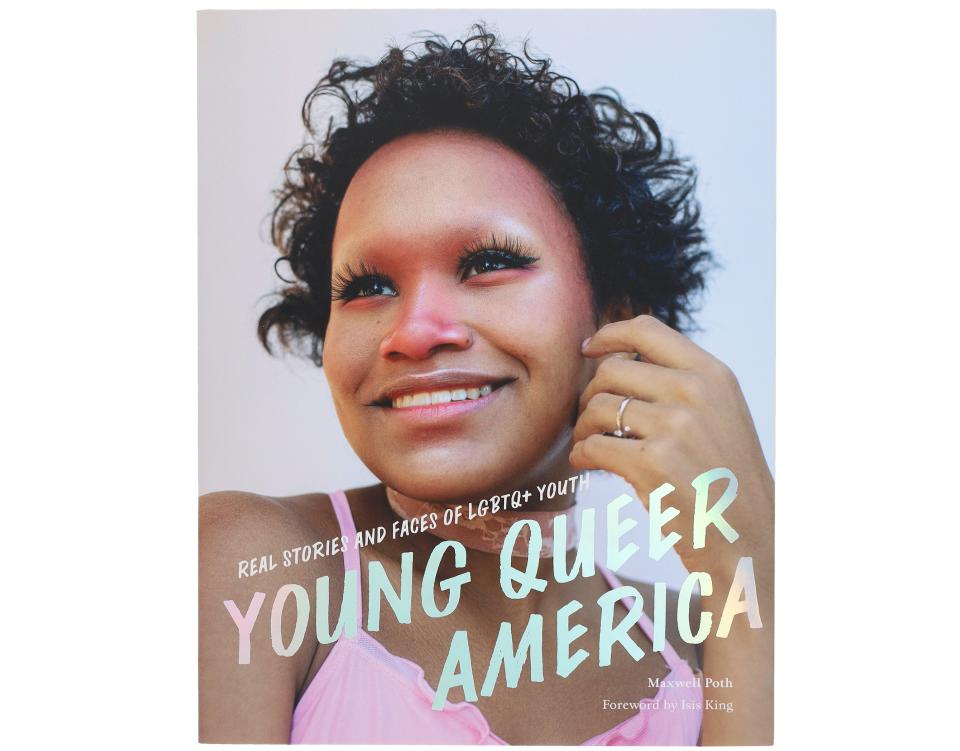
Looking for more ways to get involved? Check out all of BuzzFeed's posts celebrating Pride 2023.
